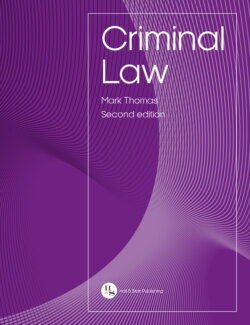Читать книгу Criminal Law - Mark Thomas - Страница 85
На сайте Литреса книга снята с продажи.
2.6.4.1Official duty
ОглавлениеWhere a person has an official duty to act, for example a member of the emergency services, their omissions can give rise to criminal liability. For example, in R v Dytham [1979] QB 722, the defendant, a uniformed police officer, whilst on duty (though shortly to go off duty), stood aside and watched as a man was beaten to death outside a nightclub. He then left the scene, without calling for assistance or summoning an ambulance. The defendant was charged with and convicted of wilful misconduct in public office. On appeal, Lord Widgery CJ commented:
The allegation made was not of mere non-feasance but of deliberate failure and wilful neglect. This involves an element of culpability which is not restricted to corruption or dishonesty but which must be of such a degree that the misconduct impugned is calculated to injure the public interest so as to call for condemnation and punishment.
There is a possibility that Dytham could have faced prosecution for manslaughter if it could have been proven that his inaction contributed to the victim’s death. However, there was no clear evidence in that case which showed that the defendant could have saved the victim, even if he tried. Indeed, Hogan (‘Omissions and the Duty Myth’ in Smith (ed), Criminal Law Essays in Honour of JC Smith (Butterworths, 1987)) argues that it would be inappropriate to punish a defendant like Dytham for the consequences of his omission given that he did not actually cause such consequences. In particular, Hogan states that ‘public officers who neglect without reasonable cause to perform the obligations of their offices may be convicted of an offence but the offence lies in the neglect and the office holder does not become a party to the harm he might have prevented’. Whether Dytham could have been convicted of manslaughter is now a moot point; however, it is worth considering this matter in case a similar situation arises in a problem-based question.
Should a case similar to Dytham arise today, the defendant may also be liable for the new offence of corrupt or improper exercise of police powers contrary to s 26 of the Criminal Justice and Courts Act 2015.
